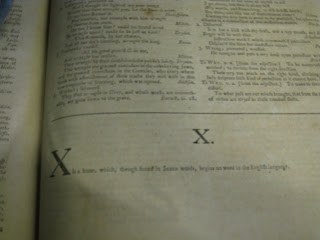

The last image is of the entry for the letter "X." As I mentioned before, Johnson included no words in his dictionary that began with the letter. The text reads: "X is a letter which, though found in Saxon words, begins no word in the English language."


So I've transcribed some of the Dictionary's preface that I thought was particularly interesting (Remember when McKean told us to read the frontmatter? It turns out she was right!). It gives us some insight into Johnson's worldview, as well as his philosophy of lexicography (prescriptivism):
"In adjusting the ORTHOGRAPHY, which has been to this time unsettled and fortuitous, I found it necessary to distinguish those irregularities that are inherent in our tongue, and perhaps coeval with it, from others which the ignorance or negligence of later writers has produced. Every language has its anomalies, which, though inconvenient, and in themselves at once necessary, must be tolerated among the imperfections of human things, and which require only to be registered, that they may not be increased, and ascertained, that they may not be confounded: but every language has likewise its improprieties and absurdities, which it is the duty of the lexicographer to correct or proscribe.
As language was at its beginning merely oral, all words of necessary or common use were spoken before they were written; and while they were unfixed by any visible signs, must have been spoken with great diversity, as we now observe those that cannot read catch sounds imperfectly and utter them negligently. When this wild and barbarous jargon was first reduced to an alphabet, every penman endeavored to express, as he could, the sounds which he was accustomed to pronounce or to receive, and vitiated in writing such words as were already vitiated in speech. The powers of letters, when they were applied to a new language, must have been vague and unsettled, and therefore different hands would exhibit the same sound by different combinations."
Judging by the second paragraph, it seems to me Johnson is one of the first scholars to identify the phenomenon of the eggcorn! As he says: "those that cannot read catch sounds imperfectly and utter them negligently." He cites illiteracy as the root of this problem, since our only knowledge of a word, then, is what we hear, which can often be wrong--either we mishear or the person we hear the word from has misheard and repeated what he thought to be correct. My third graders are familiar with this problem; it's the crux of the playground game "Telephone." Naturally, with widespread illiteracy, Johnson's lifetime is the heyday of the eggcorn! Anyway, even in this short passage, Johnson's description takes on a literary tone. I just love how he calls our language before writing and standardization "wild and barbarous jargon." If you can get your hands on a copy--even a later edition--it really is worth a look!
--Amy
5 comments:
Oh Amy, you would be fascinated by a really old dictionary =). I was just reading about Noah Webster's first dictionary and spelling book, whatnot. Are any of those in the Yale library?
Anyway, sounds like you are enjoying Yale very mucho!
Hey, Jane!
It's so cool that you follow our blog! Where/what/why were you reading about Webster? Awesomely enough, it turns out we do have a lot of Webster's original work here--which actually isn't too surprising, since Webster himself was a Yale alum!
Do you mean An American Dictionary of the English Language (I think that's his most famous one) or A Compendious Dictionary of the English Language (technically his first, I think?). According to the Yale online catalogue, it looks like we have first edition copies of both in Beinecke, our rare books and manuscripts library!
Hope that answers your question--and hope you're enjoying your junior year!
--Amy
I imagine she would have read about it around chapter 7(?) of Brinkley, if she's an APUSHer. I distinctly remember a section which refers to, among other things, Webster's blue-backed speller, Republican education and virtues, and the cultural distinctions which began to emerge in the fledgling US.
I can't believe you remember that, Ron xP Today our team had to define Washington Irving for Pictionary but couldn't remember what he wrote -_-
I'm actually supposed to be doing APUSH right now. I really abhor these American Revolution essays.
and yes, The Fluent Society is still in my feed in Gmail. I hadn't seen any updates in quite a while.
Post a Comment